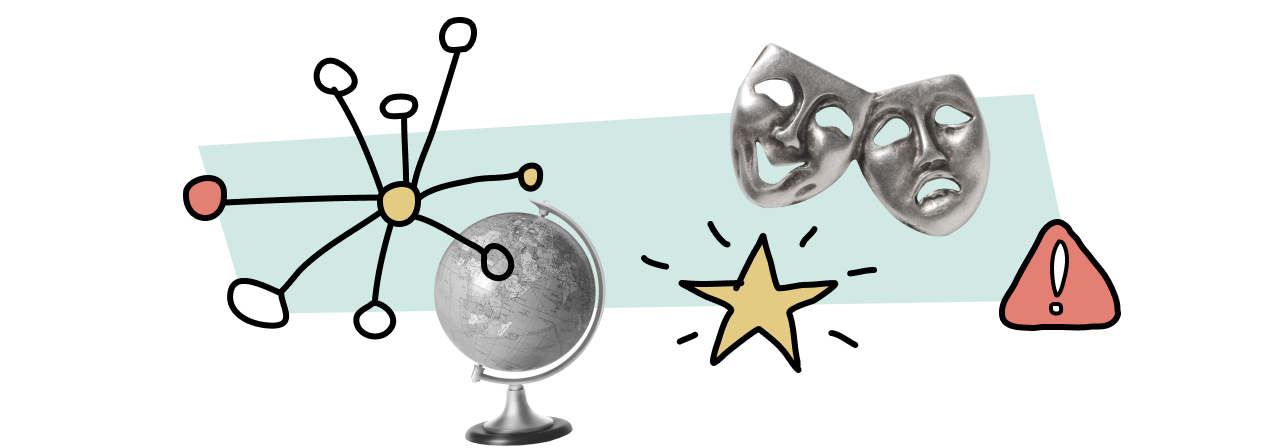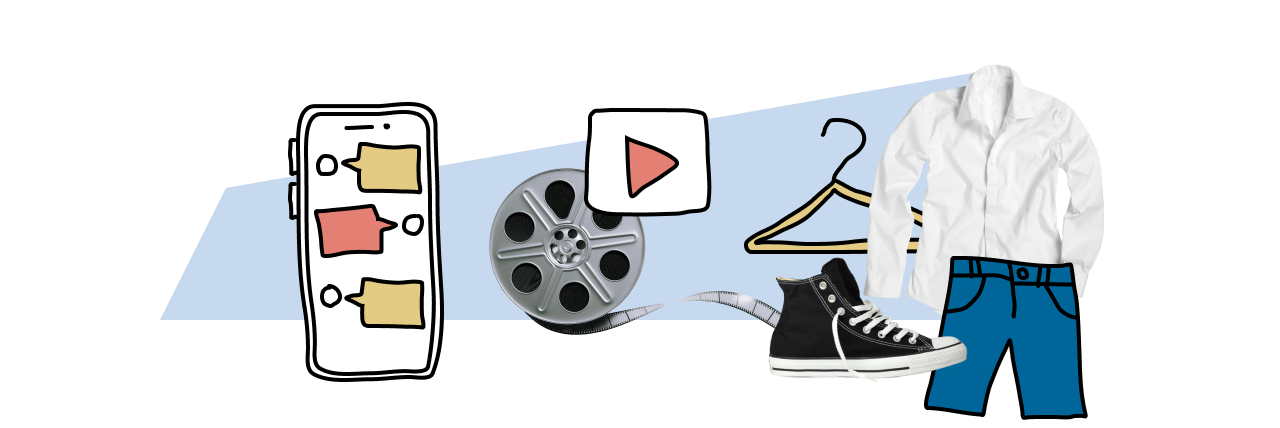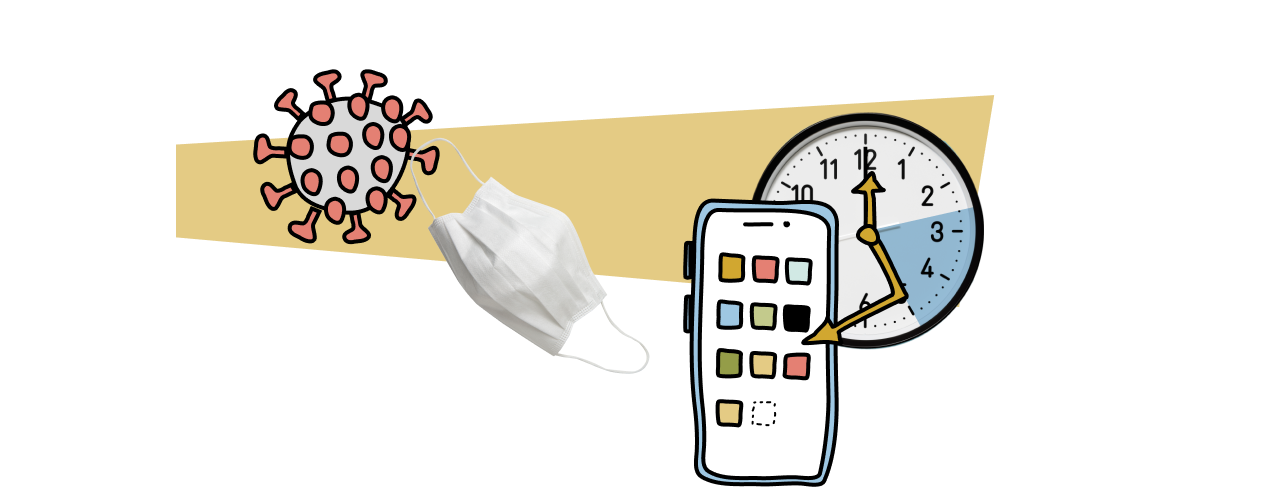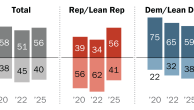Key themes in focus group discussions among teens about the role of social media in
their lives
- Teens’ reactions to what they see on social media and how they feel about posting run the emotional gamut from anxiety to excitement
- Teens have appreciation for social connectivity on these platforms but also concerns about drama, unrealistic expectations and bullies
- Different social media platforms serve different purposes for teens like general socializing, entertainment and direct personal communication
- Teens acknowledge the tensions of “cancel culture” on social media
- Teens have a range of definitions for digital privacy
- Activism is a draw for some teens on social media
- Some teens say their use of social media changed during the pandemic
- Teens detail how their lives would change if social media disappeared overnight
Teens can have a wide spectrum of experiences on social media and an extensive range of feelings about what happens to them on these platforms. A variety of studies have explored the impact of social media and the internet on teens, including articles about technology’s possible links to teens’ mood disorders and other mental health issues. To understand the ways teens think about these matters, Pew Research Center conducted four focus groups that covered the purposes and contexts of their use of social media. Some of the main takeaways from the groups are highlighted in the box on the right.
Teens’ reactions to what they see on social media and how they feel about posting run the emotional gamut from anxiety to excitement
The teens in the focus groups generally do not report they have uniformly bad or good experiences with social media. They say they have several kinds of social and educational experiences, and their responses to questions about their use of social media and its impact vary depending on the context.
Several parts of the focus group encounters touch on some possible emotions teen might have as they use social media. Here are some of the highlights:6


Anxious: “People try to be social-media perfect. They live outside the real world and live more in social media. Is this [moment in my life] social media-worthy? Everything is gauged with that. So, that’s something I feel, people are no longer as real as they’re supposed to be. They just want to be picture perfect.” – Teen girl

Sad: “One time, my friends posted without me and I felt excluded, which made me sad. … They all hung out without me and were posting on social media.” – Teen girl

Jealous: “People who are actually making money off social media and you’re like, I’m so broke and they have a lot of money. So, sometimes you can feel jealous.” – Teen girl
And on the positive side:

Excited: “Sometimes I’ll find out news when I’m on social media. Like, something good that happened … whether it’s something personal, or if it’s something public for the world and it makes me excited.” – Teen girl

Happy: “Yes, so I’ll be scrolling through TikTok, and then I see a wholesome moment or something like that like someone being kind to one another, that just makes me happy.” – Teen boy
These observations come from four virtual focus groups conducted Jan. 12-13, 2022, that were managed by PSB Insights. Each group was convened with a moderator and four participants for a total of 16 participants overall. The groups were split by gender and age group. Recruitment aimed at getting insights from a diverse range of teens from different racial, ethnic and socioeconomic backgrounds. For details on how the discussions were facilitated, see Appendix B.

Teens have appreciation for social connectivity on these platforms but also concerns about drama, unrealistic expectations and bullies
Teens have been asked by the Center and others about the good and bad sides of social media for years. In these focus groups they are fluent about the difficult and delightful parts of connectivity. Some started their overview of the role of social media in their lives by highlighting their ability to communicate with others on social platforms:
“I love the fact that social media has no boundaries. The fact you can communicate with people around the world is something really, really amazing, because you can just be at the comfort of your home and you could talk to someone that’s in Italy, in Rome, anywhere in this world – as long as they have access to social media.” – Teen girl
“I’ve liked, especially during the pandemic, being able to communicate with my friends more, since I couldn’t see them in person. And then also, having something to watch to entertain me, which was good, because we were just stuck at home.” – Teen girl
In addition to mentioning social media as a means of communication, some teens also discussed how educational social media can be, specifically noting how social media can help them learn about others’ cultures and their perspectives.
“What I like about TikTok and YouTube and Instagram and stuff like that [is that] you get to see other people’s perspectives and how they think, instead of just always listening to your thoughts.” – Teen girl
“So, what I like about social media is it makes it easy to connect with the people from different parts of the world … it helps you to experience cultures from around the world, such as people’s dressing, what they eat, and you also get a chance to know that, oh, I have to visit this place.” – Teen girl
What don’t they like about social media? Peer pressure or cultural expectations that people should look and act a certain way. One older girl offers this concern:
“I also feel like social media sets up unhealthy expectations for your body or your lifestyle. I know a lot of people feel [insecure because] of Instagram influencers or celebrities, of having a dream body or something, or their lifestyles. That they’re always at parties, or drinking.” – Teen girl

Beyond the issue of teens trying to live up to their own and others’ expectations, some teens talked about their anxiety from seeing drama and negativity on social media and watching bullies go after others.
“Sometimes there can be drama or some problems on social media that I’ve seen. And sometimes it can cause drama with my friends, but also drama with influencers and stuff.” – Teen girl
“Sometimes it could be really anonymous, and people can say stuff about … you or other people and you don’t know who it is.”– Teen boy
“I agree with the negativity part. It’s just all over at this point. And sometimes the pettiness of some people. Some so-called influencers will have one person that got on their bad side … and they have their followers just attack on that person for no apparent reason.”– Teen girl
“Okay, for me, it is bullies or negative comments or stuff like that, you just see a lot of people hating, under the comments, under your posts and stuff like that.” – Teen boy

There were other negative aspects of social media that emerged in these teens’ conversations. Here are examples of safety concerns and an encounter with a fake profile on social media:
“Like people just messaging you, and you find out that they aren’t real, like fake people. Fake people are out so much on social media.” – Teen boy
“So, what I don’t like is it’s not really safe to use, because, for instance, you’ll just be there and someone messages you, like a stranger. And I’ve read stories about social media being used to track people and killing them.” – Teen girl

Different social media serve different purposes for teens like general socializing, entertainment and direct personal communication
When asked to think about the role of social media in their communications and information gathering, some of these teens talked about distinctions among platforms when it comes to the tone of the sites, varying purposes and the audiences that different platforms offer them. For some, the breakdown was this: They used Snapchat for communicating with others; TikTok for learning, entertainment and discovering trends; and Instagram for pictures and seeing what others are doing.
More generally, they reported there are times when they hoped to gain an audience for their ideas and creations and times they wanted to share small-scale, intimate encounters with close friends. They described a communications and media world full of challenging calculations about what they want to share and with whom they want to share it. Here’s how a few teens speak to these themes:
“For me, TikTok is more of a place to watch videos and then Instagram more to see what my friends are up to, and then Snapchat as a way of more direct communication.” – Teen girl
“Yes, I mainly use Snapchat to text my friends during school and Snapchat them and after school, just communicate with them. And I use mainly Instagram to just send pictures and stuff to my friends like memes or like clothes.” – Teen boy
While Snapchat, TikTok and Instagram were mentioned often throughout the conversations, other social media platforms were part of the mix for some participants:
“I use Snapchat to communicate with my friends, and I use it every day, just [to] keep in touch with them and I use Instagram to post pictures and show them. And YouTube, I just do it to watch videos and pass time.” – Teen boy
“I use WhatsApp for chatting a lot; then TikTok I chatted about a bit less, I just do a lot of challenges on TikTok. Instagram, I just watch videos and check the latest trends or just check pictures like that. I think chat will be a bit less, but like WhatsApp is just a full chat service.” – Teen boy
“I would say Instagram is my home for fashion sense. If I’m trying … to match up an outfit or come up with something unique to wear, I go on the Explore page on Instagram and you see a lot of content there. So, you can get fashion inspired with nice outfits to put on for events. I feel Snapchat for me, it’s more intimate. People just show off, ‘Oh, I’m here.’ ‘If you’re at this location, we could meet,’ and stuff like that.” – Teen girl

Teens acknowledge the tensions of ‘cancel culture’ on social media
As a concept, cancel culture is relatively well known to the teens in our focus groups. One comment summarizing the mixed views on the subject among some focus group participants comes from an older boy:
“I think it has its pros and cons. A lot of the time, I feel like they could be very harsh to people who are not deserving of all of the hate. But in some instances, I also find that it points out flaws and people who tend to have lots of followers and, like, aren’t very good people.” – Teen boy
When asked about people calling out others on social media for something they did not like, some teens voiced a preference for calling out friends in person rather than on a social media platform.
“I want to see their reactions and stuff like that, and sometimes I don’t do posts [that] make it a bit more embarrassing and stuff like that, so just want to just sit down some person.” – Teen boy
“Yes, I think I can agree with that. I don’t want to put them on blast, but I want to let them know that what they’re doing is wrong.” – Teen boy
And a few teens shared their thoughts on the prospect of getting “canceled” themselves:
“I don’t think I have that fear, because I accept the fact that I’m human. I’m not perfect. So, if people cannot face that, I think it’s actually their loss and not mine.” – Teen girl
“I feel like I’m very mindful of what I say or what I do. I don’t use racial slurs, I don’t make jokes about assault or harassment. I would never do that. It’s just not in my mindset to treat people that way or talk in that way.” – Teen girl

Teens have a range of definitions for digital privacy
Some previous research by the Center has shown that privacy is on teens’ minds as they use social media. The teens in these focus groups tended to think about privacy in the context of their social lives – such as keeping their personal information and feelings to themselves, rather than having it shared with others. They did not usually volunteer answers concerning surveillance by corporations or governments, issues that are often part of adults’ thinking about privacy. Asked to define privacy in their own words, here are some of their comments:
“What do you mean by digital privacy? … I feel like all of my social media accounts personally are privated, so only the people I let follow me can see the stuff I post. I would feel weird if anyone could see my videos and stuff, I don’t know.” – Teen girl
“I would describe it as keeping your personal life separate from your online identity and keeping that information off the internet.” – Teen boy
“Okay, what do you mean by digital privacy? You mean that any information I use on a social media platform does not go out to people, my phone number, my pictures, my videos are safe on that platform. … My data [is] not being shared with anyone, that’s what I understand by privacy.” – Teen boy
Several social media companies have added a feature for users to share posts that are only visible to a select group of their followers that they choose. On platforms such as Snapchat and Instagram, these are known as private stories. Some of these teens described how they used private stories across their respective social media platforms.
“I have private stories. I have a normal story where everybody can see it and then I have a private story just for my personal friends that I hang out with all the time and talk to all the time.” – Teen boy
“I don’t like to post – say it’s a funny picture or something – on my main story. Private story is more [for] like your close friends, the people you talk to. Not really family. Unless it’s a cousin you’re close with.” – Teen girl

Activism is a draw for some teens on social media
In their comments during the focus groups, teens showed they are aware that observers on social media – both people they know and strangers – could be carefully watching what they say and do. They reported there are ways in which this inhibits the kinds of things they do and other ways in which this can be helpful, for instance, in promoting causes they care about. When the older teens were asked about using social media for the purposes of political and social activism, some said they appreciate the capacity of the platforms to spread awareness about a cause or use popular hashtags to draw attention to an important movement.
“I’m Black and I say [on social media] to stand up for the Black community, to say no to racism. So, that’s my focal point – and police brutality. So, those are [the issues] I speak on, because I feel a lot of people in my race, we face that every single day. Even at school, when coming back from school, at malls and places like that.” – Teen girl
“I come from an Armenian background, and I don’t know if any of you know, but Armenia has been though a genocide and it had a war recently that a lot of people don’t talk about. It’s not in history books. It’s not really looked at as important, but through social media I’m able to post about it, because I have a lot of followers that aren’t Armenian from school, and like this, they can get some knowledge about what’s going on.” – Teen girl
And while one boy also posts in support of certain causes, he says he is mindful of avoiding repetition. If others already made the exact same post, he said that he wouldn’t post it because he felt he had little new to share.
“Yes, I posted in support of [Black Lives Matter] and things like that. But I don’t usually post about spreading awareness for causes unless it’s something that’s personal to me. And like, I think it’s not out there because I feel like a lot of the time people will just get caught up posting the exact same post and like, anyone who will see it from me will have already seen it from somewhere else.” – Teen boy
In the focus groups, younger teens were not explicitly asked about their engagement with online activism, but the subject emerged during the conversation in one of their groups.
“Well, sometimes there have been some things about COVID-19, about saving some endangered animals and also when the Black Lives Matter movement was at its peak probably, that’s when I would post a lot of that.” – Teen girl

Some teens say their use of social media changed during the pandemic
Some researchers have observed the changes in teens’ social media use since the start of the COVID-19 pandemic. A part of our focus group conversations centered on questions related to whether teens’ use of social media changed during the pandemic. Several participants say they began to use social media more. As a teen girl put it, “I think the disconnect from my peers socially made me want to engage more with social media.” Others described how they started increasing their use of some platforms. “I started using Snapchat and TikTok a lot more,” noted a teen boy.
In response to a follow-up question about why he thought he used social media apps more, another boy said:
“Probably because I had more free time and I didn’t have to deal with [other issues] at the beginning [of the pandemic], a lot of work and it just caused me to be on my phone more and stuff.” – Teen boy
The older teens were asked a broad question about the degree to which their lives have changed since the beginning of the pandemic. These are some of the changes they described:
“Well, I can say because of the pandemic I was not really, can I say, acquainted that much with social media and I really thought that I could never have this virtual communication with people. I felt that it has to be face to face. But with this, I can see that life can go on without you seeing that person every day. So, it kind of showed me an innovative way of how the world works, so you can still move even without seeing each other.” – Teen girl
“During the pandemic, I feel like less people were using social media in certain ways, because there wasn’t much to post, like going out. You’re just staying at home. But TikTok, everyone was on it, because it was their source of entertainment.” – Teen girl
At the same time, some of these teens mentioned abandoning certain platforms that they lost interest in during the pandemic.
“I stopped going on Reddit and Tumblr, and Pinterest became a lot less used. … It was either I got distracted with other apps, or I lost interest in what I was looking on there in the first place.” – Teen girl
“I think I kind of stopped using Twitch. I didn’t really go back to it. I just saw it and I decided to put it on, but I never went back to it at all.” – Teen girl

Teens detail how their lives would change if social media disappeared overnight
Social media “sabbaticals,” “fasts” and “sabbaths” have been embraced in some circles for years, and prior research has shown that from time to time some teens also take breaks from social media. Our survey also asked teens how hard it would be to give up social media and found that 54% said it would be very or somewhat hard, compared with 46% who said it would be very or somewhat easy.
In the focus groups we asked a related question: “What would happen if social media disappeared overnight?” Other research that looked at adults has found that the prospect of the sudden disappearance of social media might have a varying impact, for some raising the prospect of positive outcomes, such as more happiness and privacy, and for others negative outcomes, such as difficulty connecting with others.
Our focus group participants had a range of reactions, too: Some considered the potential loss of social media an inconvenience, while others said it would be good for them mentally to spend less time in a “toxic” place, and yet others said their lives would not change.
“I feel like I would get bored a lot quicker. I spend most of my time on TikTok and YouTube and stuff and if that just suddenly disappeared overnight, I feel like I’ll have to search deeper for stuff that I like and miss the content that I used to watch previously.” – Teen girl
“I think it would be a little bit [messed up if social media disappeared]. I spend 99% of my time indoors in front of my computer, if I’m not playing games, I’m watching pirated videos. If I’m not watching videos, maybe I’m reading an article. I’m always online. And I hardly step out of my room. I have had issues with my dad. He said my room is too creepy. I should come outside and play with people but I’m not really good at making friends. So, it’s a bit hard on me.” – Teen boy
“[When] we were younger, [social media] didn’t have an effect on us and social media wasn’t as big as it is now. I feel like we were more free and more happy, and no stress or overthinking or insecure.” – Teen girl
“I’d probably not be able to make plans with my friends as easily. Whenever we want to go out, we just text each other in our group chat, but if not then making friends would be really hard, because if someone wasn’t able to make it or if we planned something and there’s a person that was meant to pick us up that couldn’t make it, we wouldn’t know.” – Teen boy
“[Life] kind of wouldn’t [change] because I usually play outside.” – Teen boy

Illustrations by Margaret Porteus




